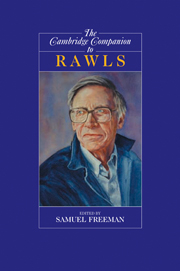Book contents
- Frontmatter
- Introduction
- 1 Rawls and Liberalism
- 2 For a Democratic Society
- 3 Rawls on Justification
- 4 Rawls on the Relationship between Liberalism and Democracy
- 5 Difference Principles
- 6 Democratic Equality
- 7 Congruence and the Good of Justice
- 8 On Rawls and Political Liberalism
- 9 Constructivism in Rawls and Kant
- 10 Public Reason
- 11 Rawls on Constitutionalism and Constitutional Law
- 12 Rawls and Utilitarianism
- 13 Rawls and Communitarianism
- 14 Rawls and Feminism
- Bibliography
- Index
4 - Rawls on the Relationship between Liberalism and Democracy
Published online by Cambridge University Press: 28 May 2006
- Frontmatter
- Introduction
- 1 Rawls and Liberalism
- 2 For a Democratic Society
- 3 Rawls on Justification
- 4 Rawls on the Relationship between Liberalism and Democracy
- 5 Difference Principles
- 6 Democratic Equality
- 7 Congruence and the Good of Justice
- 8 On Rawls and Political Liberalism
- 9 Constructivism in Rawls and Kant
- 10 Public Reason
- 11 Rawls on Constitutionalism and Constitutional Law
- 12 Rawls and Utilitarianism
- 13 Rawls and Communitarianism
- 14 Rawls and Feminism
- Bibliography
- Index
Summary
Rawls and his critics agree on at least this: his theory is liberal. This essay asks, To what extent is it also democratic? Does Rawlsian liberalism denigrate democracy as some critics charge? Despite the enormous literature on Rawls, remarkably little has been written on the relationship between liberalism and democracy in the theory. Critics over the years have suggested that the theory denigrates democracy in one of three ways, which I consider by posing three critical questions about the theory. First, does it devalue the equal political liberty of adults (at any one of three levels of theory formation)? Second, does it devalue the political process of majority rule? Third, does it devalue the kind of civic discourse that relies on more comprehensive philosophies – both religious and secular – rather than on the free-standing political philosophy that Rawls's theory distinctively defends?
In interpreting Rawls’s understanding of democracy, I draw upon both A Theory of Justice (Justice) and Political Liberalism (Liberalism). The two works diverge at points, which I discuss when the differences bear on Rawls’s understanding of the relationship between liberalism and democracy. But together they have more to say about the relationship than either work alone.
- Type
- Chapter
- Information
- The Cambridge Companion to Rawls , pp. 168 - 199Publisher: Cambridge University PressPrint publication year: 2002
- 6
- Cited by

